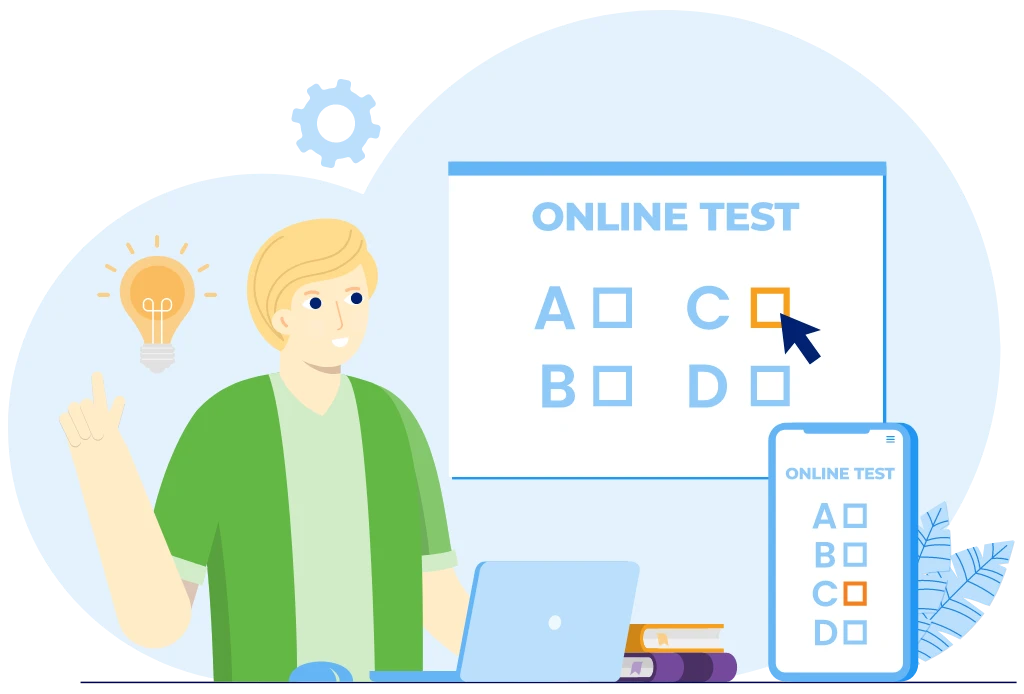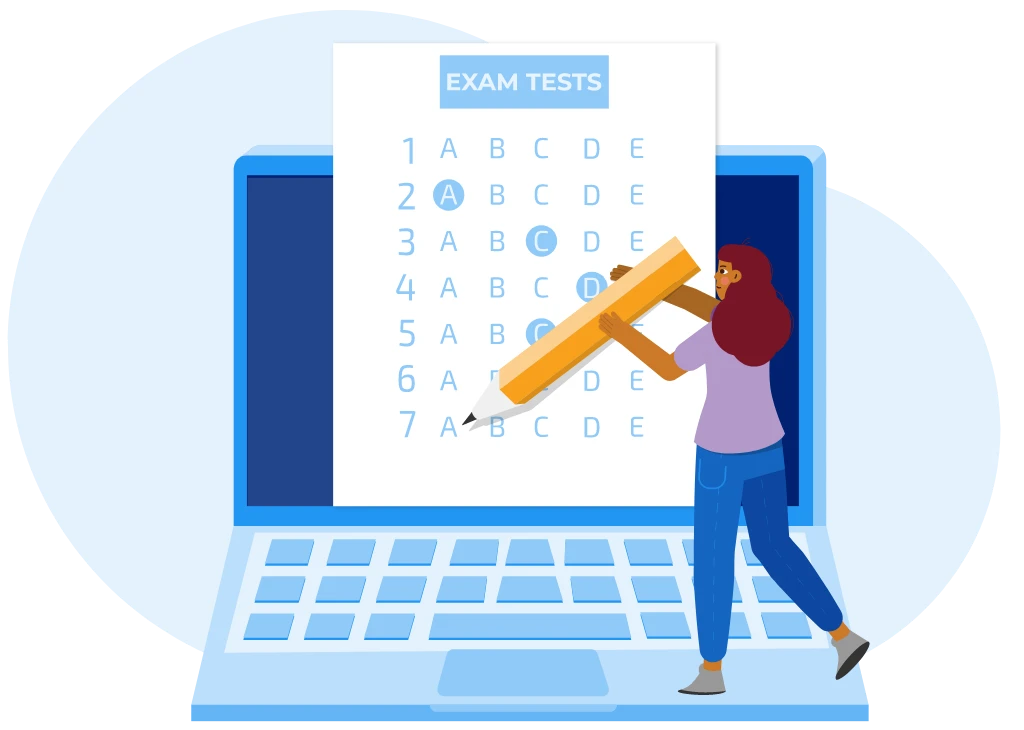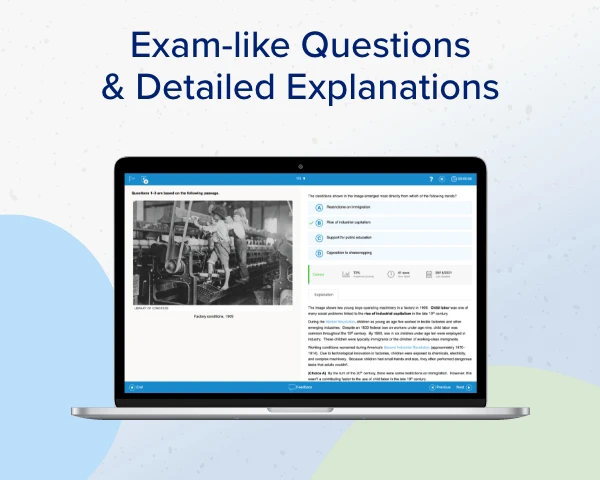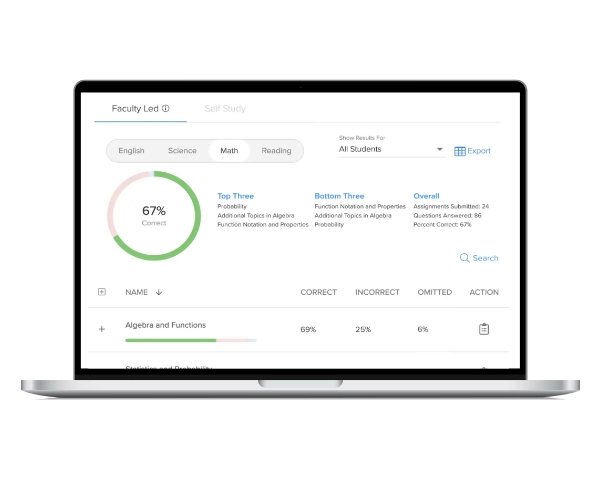In the ever-changing landscape of education, change is on the horizon. The imminent shift to digital AP® exams in the spring of 2024 marks a significant leap for the AP program. As of May, schools will have the option–at least for eight specific AP courses–to have their students take their exams either online or on paper. It’s not merely about new technology; it’s a strategic move aligning with the dynamic nature of today’s learning environments. As we stand on the cusp of this transformation, educators must grasp the depth of moving from traditional paper-and-pencil exams to a digital format. This is why we’ve provided a concise overview of the impending changes, the motivations driving the digital shift, and the critical importance of understanding these transformations for effective preparation.
The Transition to Digital AP Exams
The transition to taking an AP exam online is a profound shift, extending beyond mere technological updates. It’s a deliberate response to the evolving needs of students immersed in the digital age. This transformation goes beyond the traditional assessment of knowledge; it’s a dynamic approach designed to evaluate digital literacy and cultivate problem-solving skills. In the context of today’s rapid-paced learning environments, these skills are pivotal, equipping students with subject-specific knowledge and the adaptable competencies essential for success in a technologically driven world. The move to digital exams is, therefore, a strategic step towards aligning education with the contemporary demands of the digital era.

In this context, the significance of the digital transition cannot be overstated. The educational landscape is shifting towards a more tech-savvy approach, preparing students for a future where digital skills are as crucial as subject expertise. The term “digital AP” encapsulates this shift, emphasizing the integration of digital technology into the assessment process. As AP exams embrace a digital format, they become more than just tests; they become a reflection of the evolving educational needs in an increasingly digitized world.
Why Some AP Exams Are Going Digital (And Others Are Not)
The decision to move certain AP exams to a digital format is rooted in the goal of providing a more authentic assessment experience. While some subjects are making this transition, others are not—at least for now. The focus is on aligning assessments with real-world challenges, ensuring students are equipped with the skills necessary for success beyond the classroom.
Here is a list of which AP exams are digital (or will become digital in spring 2024):
- AP Computer Science Principles
- AP English Language and Composition
- AP English Literature and Composition
- AP European History
- AP Seminar
- AP U.S. History
- AP World History: Modern
- AP African American Studies (select pilot schools for 2023-2024)
The introduction of online AP exams presents a significant shift in the approach to assessment. It’s a recognition that traditional paper-and-pencil methods may not fully capture the range of skills and competencies that students need in today’s digital age. The move towards “digital AP” aligns with a broader trend in education, where online platforms and technology are becoming integral components of the learning experience.
Benefits of Digital AP Exams
The new digital format of some AP exams brings great benefits such as enhanced accessibility for students with disabilities, increased efficiency while test-taking, and a positive environmental impact by reducing paper waste.4
Enhanced Accessibility
Digital AP exams increase accessibility for students by providing features like customizable text size, built-in accessibility tools, and the option for accommodations such as extended time. These digital enhancements cater to diverse learning needs, ensuring a more inclusive testing environment for students with disabilities or specific learning preferences.
Greater Efficiency
Online AP exams offer greater efficiency for students during the test-taking process, especially evident in subjects like AP European History or AP Literature and Composition. Typing responses allows students to compose essays more rapidly, eliminating the time-consuming aspects of handwriting. The ease of editing digital documents also spares students the messiness of traditional erasing and rewriting, enabling a smoother and more time-efficient examination experience.
Environmental Impact
Digital AP exams contribute to a positive environmental impact by circumventing the significant paper waste associated with traditional paper-based exams. The elimination of testing booklets and related materials reduces the ecological footprint of the examination process, making digital formats a more eco-friendly choice. This move towards sustainability aligns with the broader global efforts to reduce paper consumption and supports environmentally conscious practices in education.
Offering Digital AP Exams at Your School
It’s important to note that digital exams are optional for most subjects, except for AP African American Studies in pilot schools. Schools need to update their exam orders for digital exams by November 15, 2023.
This shift to digital exams also reflects the broader trend of online education and assessment. As the education sector increasingly embraces online platforms, online AP exams have become a natural progression. The move to online AP exams is not just about convenience; it’s about adapting to the evolving preferences and needs of students who are accustomed to digital interfaces in various aspects of their lives.

Exam Format and Structure
Digital exams look a lot like the ones on paper. They have the same sections, questions, and timing. Students use the Bluebook™ app to test–the same app used for the digital SAT®–which allows them to review questions and go back within a section. This adds some flexibility to how they take the test, making it a bit more modern.
Taking an AP exam online involves a shift in the traditional format, but the core structure remains intact. The term “AP Exams” continues to encompass the comprehensive assessments that evaluate a student’s mastery of a particular subject. However, the move to a digital format introduces new dynamics, emphasizing not just what students know but also how they navigate and engage with the content using digital tools.
Technology Requirements
Students can use different devices for digital exams, like personal or school computers (Windows and Mac), school Chromebooks, and personal iPads with keyboards. But there’s a catch – they need an internet connection to start and finish the exam. Also, it’s important to make sure the testing devices have the latest version of the Bluebook app.
The incorporation of technology into AP exams brings forth the importance of understanding and meeting specific technological requirements. The term “technology requirements” encompasses the necessary specifications and conditions for a seamless digital exam experience. As schools prepare for the digital transition, ensuring that students have access to compatible devices and a stable internet connection becomes a critical aspect of exam preparation.
Planning and Logistics
Updating exam orders to indicate digital exams by the specified deadline is the key step in making the transition. The room and seating requirements are similar to paper exams but include additional considerations for network and power requirements.
The planning and logistics involved in the transition to digital AP exams require careful consideration of various factors. “Planning and logistics” encompass the strategic steps and organizational efforts needed to seamlessly integrate digital assessments into the existing framework. This involves not only updating exam orders but also ensuring that the testing environment meets the specific requirements of digital exams.
Administering Exams
Proctors use the Test Day Toolkit web application to administer digital AP exams. Students should keep their devices open and uncovered throughout testing, ensuring answers are submitted when they see the “Congratulations!” screen in Bluebook. The LockDown Browser is not required for digital AP testing.
The administration of digital AP exams introduces a new dimension to the role of proctors and the overall testing process. Administering exams involves using specialized tools and applications to ensure a smooth and secure testing environment. As the traditional exam day procedures evolve, proctors play an integral role in guiding students through the digital assessment process.
Student Accommodations
Accommodations, such as extended time, are provided in Bluebook. The testing app controls timing for students with approved accommodations, adding extra time to the timer. Specific digital exam formats are enabled for students with approved accommodations, ensuring compatibility with assistive technologies.
The term “student accommodations” in the context of digital AP exams refers to the provisions made to ensure that students with specific needs can fully participate in the assessment process. This includes features within the digital platform that cater to students requiring extended time or other accommodations. As education becomes more inclusive, accommodating diverse learning needs becomes an integral aspect of the assessment process.

Key Takeaways
The transition to digital AP exams is not just a technological upgrade; it’s a strategic move to align assessments with the demands of today’s educational landscape. Educators play a pivotal role in guiding their schools and students through this shift, emphasizing the optional nature of digital exams, the specific subjects making the transition, and the technology requirements involved. It’s crucial to understand the exam format, structure, and logistics of administering digital exams, ensuring a smooth transition for all stakeholders.
As the educational landscape evolves, embracing the digital option becomes not just a choice but a proactive step toward preparing students for success in a digitally-driven world. This comprehensive guide aims to equip educators with the knowledge and tools needed to navigate this transformative journey effectively, fostering success.

Frequently Asked Questions [FAQs]
Are AP scores sent digitally?
Educators can access AP scores through the College Board®‘s AP Score Reporting website, where they can view and download score reports for their students. The scores are typically available in July, and educators can log in to the system using their College Board account credentials.
When do digital AP scores come out?
AP scores are usually released in early July. The specific release date can vary from year to year, and the College Board typically provides updates and notifications to educators through their official channels.
Do AP digital exams require a camera?
AP digital exams no longer require the use of a camera. Initially, the College Board indicated that both a camera and an ID would be needed for these exams, but this requirement has been eliminated. Proctors will now utilize the Test Day Toolkit web application to oversee digital AP exams.5
References
- Digital AP Exams FAQ. Digital AP Exams FAQ – AP Central | College Board. (2023). https://apcentral.collegeboard.org/exam-administration-ordering-scores/digital-ap-exams/faqs
- Digital AP exams. Digital AP Exams – AP Central | College Board. (2023). https://apcentral.collegeboard.org/exam-administration-ordering-scores/digital-ap-exams
- Key facts about digital AP exams. Key Facts About Digital AP Exams – AP Central | College Board. (2023). https://apcentral.collegeboard.org/exam-administration-ordering-scores/digital-ap-exams/key-facts
- S., S. (2023, September 17). AP Digital Exams: Everything You Need To Know. Ivy Tutors Network. https://ivytutorsnetwork.com/blog/ap-digital-exams
- AP exam terms and conditions. AP Exam Terms and Conditions – AP Students | College Board. (n.d.). https://apstudents.collegeboard.org/exam-policies-guidelines/terms-conditions




